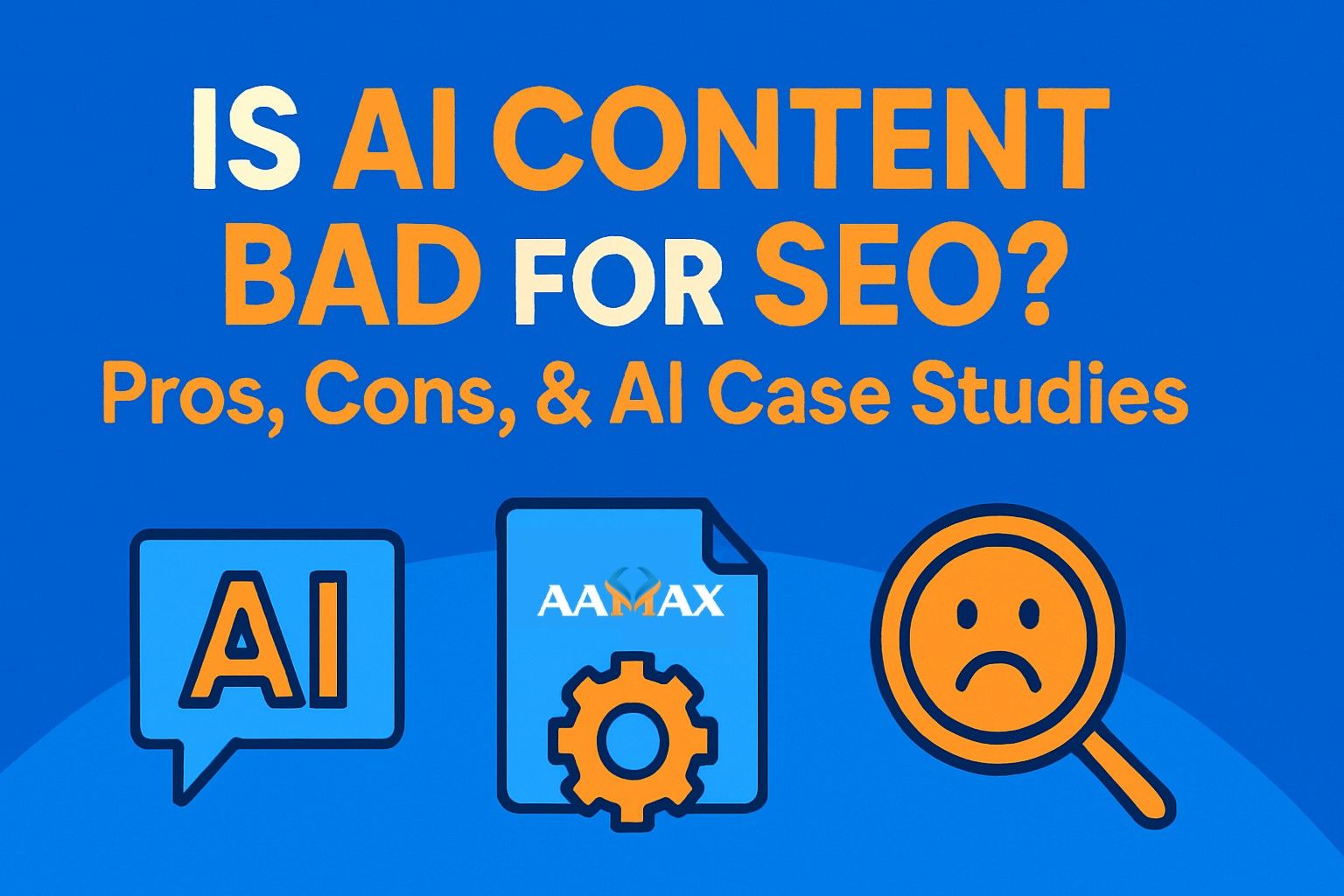
Is AI Content Bad for SEO? Pros, Cons, & AI Case Studies
Artificial Intelligence (AI) has changed the way businesses create and publish content. With AI tools like ChatGPT and other content generators, it has become easier than ever to produce articles, blogs, and web copy at scale. However, one question that continues to arise among business owners, marketers, and Search Engine Optimization (SEO) professionals is: “Is AI content bad for SEO?”
The short answer is: AI content isn’t inherently bad for SEO, but its impact depends on how it’s used. In this guide, we’ll explore the pros and cons of AI-generated content, examine case studies, and provide practical insights into whether AI is the right fit for your digital strategy.
What Is AI Content?
AI content refers to written material generated by artificial intelligence algorithms. Instead of being drafted manually, the content is produced using natural language processing (NLP) models that are trained on massive amounts of data. These tools can create blogs, product descriptions, ad copy, and even long-form articles within seconds.
AI content creation can save time and money, but many people worry about whether Google penalizes it or if it lacks the authenticity needed to engage audiences.
Does Google Penalize AI Content?
One of the biggest concerns is whether AI content is against Google’s SEO guidelines. In 2023, Google clarified its stance: Google does not penalize content simply for being AI-generated. Instead, it evaluates content based on its quality, relevance, and usefulness to readers.
The key takeaway: if AI content is spammy, low-quality, or doesn’t provide real value, it can harm your rankings. But if it’s well-structured, optimized, and helpful, it can perform just as well as human-written content.
Pros of AI Content for SEO
1. Faster Content Production
AI can produce long-form content in minutes, allowing businesses to scale their content marketing without needing a large team of writers.
2. Cost-Effective
Hiring professional writers or agencies can be expensive. AI tools reduce costs significantly, especially for businesses producing high volumes of content.
3. SEO Optimization Assistance
Many AI writing tools are built with SEO features, suggesting keywords, headings, and metadata to help improve rankings.
4. Multilingual Content
AI makes it easy to create content in different languages, which is ideal for international businesses looking to expand their reach.
5. Topic Ideation
AI can generate content ideas, outlines, and titles based on trending topics, helping businesses stay relevant in competitive niches.
Cons of AI Content for SEO
1. Lack of Human Touch
AI-generated content can feel robotic or generic. It often lacks the storytelling, personality, and emotional depth that humans bring.
2. Risk of Inaccuracy
AI pulls information from large datasets but may include outdated or incorrect details. This can hurt credibility and user trust.
3. Thin or Duplicate Content
Some AI tools generate repetitive or shallow content, which can lead to thin pages that Google devalues.
4. Limited Creativity
AI may struggle with creating unique angles or original thought leadership, which is crucial for competitive industries.
5. Over-Reliance on AI
Businesses that rely only on AI may neglect authentic human insights, reducing authority and engagement in the long run.
Case Studies: AI Content in Action
Case Study 1: Small Business Blog
A local business used AI tools to create 50 blog posts in a month. While traffic initially spiked, engagement rates (time on page, comments, and shares) were low. After adding human edits and more engaging formats, performance improved.
Lesson: AI can provide a foundation, but human editing is essential.
Case Study 2: E-commerce Store Descriptions
An online retailer used AI to generate thousands of product descriptions. The results were highly effective for SEO, as descriptions were keyword-rich and informative. However, the company still added human oversight to ensure accuracy.
Lesson: For large-scale repetitive content, AI is a game-changer.
Case Study 3: Authority Website
A content publisher tested AI to produce long-form articles. While the articles ranked initially, they began to slip in search results because they lacked original insights. When human subject matter experts added unique perspectives, rankings recovered.
Lesson: Originality and expertise remain critical for SEO success.
Best Practices: Using AI Content Without Hurting SEO
1. Always Edit and Fact-Check
AI can draft, but humans should refine. Editing ensures accuracy, adds brand voice, and prevents errors.
2. Focus on E-E-A-T (Experience, Expertise, Authoritativeness, Trustworthiness)
Google values content that demonstrates expertise and credibility. Add author bios, citations, and case studies to strengthen trust.
3. Avoid Keyword Stuffing
AI tools sometimes overuse keywords. Ensure content reads naturally and is user-focused.
4. Add Multimedia
Enhance AI-written text with images, infographics, or videos for a richer user experience.
5. Blend Human and AI Strengths
Let AI handle repetitive or bulk tasks (like product descriptions), while humans focus on high-level strategy and creative storytelling.
Is AI Content the Future of SEO?
AI isn’t going anywhere. In fact, it’s becoming a central part of digital marketing strategies. The businesses that succeed won’t be the ones avoiding AI but those who learn how to balance it with authentic, human-driven content.
Think of AI as a tool, not a replacement. It can accelerate processes, reduce costs, and open new opportunities—but it must be guided by human creativity and expertise.
Final Thoughts
So, is AI content bad for SEO? The answer is no, as long as it’s used responsibly. Google cares about value, not authorship. Businesses should embrace AI as a tool to scale content production while maintaining human oversight for accuracy, originality, and engagement.
For small and medium-sized businesses, the smartest strategy is to combine AI efficiency with human creativity. This hybrid model ensures your content not only ranks but also connects with your audience on a deeper level.
If you’re looking to build a powerful SEO and digital marketing strategy, consider working with professionals who understand how to maximize these tools. You can hire AAMAX, a full-service digital marketing company offering Web Development, SEO, and Digital Marketing services to help you grow effectively.







